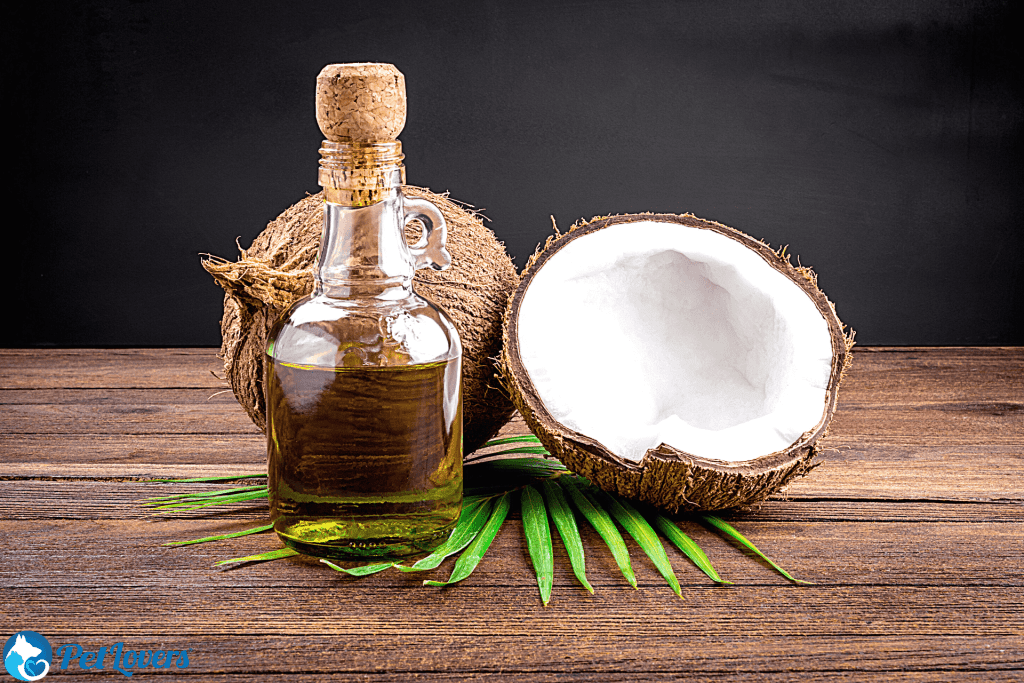Types Of Dog Brushes
Grooming your dog regularly helps minimize shedding, control where that loose hair falls, and improve the health of your dog’s

Finding dog hair in every corner of the house can be a nightmare for every homeowner. With the beginning of the shedding season, it becomes a hassle to prevent fur from latching onto your furniture, rugs, and clothes.
While the excess shed will be a hassle for you, it is also concerning for your dog. Proper removal of dead hair is imperative to prevent matting, dandruff, and skin infections. Many prevention methods can be found online, one of the most effective methods is using coconut oil for shedding dogs.
Table of Contents
Coconut oil is commonly used in various ways by humans- for skin, body, and hair health. It is also an excellent component to include in your dog’s food and grooming routine.
Coconut oil is known for deeply moisturizing your dog’s coat and dry skin. Topical use not only helps maintain a dog’s skin and coat but also its overall health. The oil is known to prevent dryness, soothe irritated skin, and disinfect the body to reduce shedding.
It also acts as a sunscreen for dogs and its antibacterial and antifungal properties prevent dermatitis, fleas, ticks, and insect bites. Coconut oil contains healthy fats such as medium chain triglycerides (MCT) that act as a conditioner on dog hair and repair any damage while locking in moisture.
Including these healthy fats in your pet’s daily nutrition allows hair follicles to grow stronger from the roots. With good-quality food, your dog is less likely to become sick, deal with infections, and will become healthier internally.
The use of coconut oil for dog shedding is commonly done topically. However, ingesting these healthy fats can be even more beneficial.
Coconut oil has been proven to aid digestion, boost your dog’s metabolism, and improve overall immunity. Acting as a superfood, it provides your pet with loads of healthy nutrients that prevent infections.
The oil’s anti-inflammatory properties also aid in better gut health, ensuring a longer life. Coconut oil is also used as toothpaste to contain bad breath and strengthen the canines’ teeth.
A lesser-known benefit of using coconut oil is its ability to heal wounds. Fleas, ticks, and insect bites can be treated by applying oil to the skin. The oil’s antimicrobial properties will heal the wound and prevent it from becoming infected.
When your dog is given such great nutrition and healthy fats, you will notice their laziness washing away as it gives them a boost of energy. They’ll become more active and willing to indulge in more physical play and exercise.

Dog shedding is a natural process that allows old, dry, and dead hair to be replaced with healthier, shinier hair. It enables hair turnover to ensure that the dog always has a healthy coat to protect itself from fleas, ticks, and infections.
Shedding usually occurs during the changing of seasons since pets tend to have thicker coats to protect themselves from cold in the winter. When spring approaches, the fur becomes lighter, allowing a cool breeze to regulate the dog’s body temperature.
However, if you observe excess shedding in your dog, that might cause concern. The excess shedding is one of the first symptoms when your dog faces any illness such as a skin infection or internal issues.
Shedding in dogs may also occur due to a lack of a proper grooming routine, allergies, or bacteria transfer from other dogs. When you start to notice that your dog is constantly uncomfortable and has an increase in itching, it’s the ideal time to visit a vet and find the root cause of the problem.
Virgin Coconut Oil is the best coconut oil for dog shedding, as it has a higher count of minerals and nutrients when compared to regular coconut oil. Virgin coconut oil stands out from others since it is extracted and sourced naturally.
The oil comes directly from the milk of the coconuts, without any exposure to heat or sunlight. With its natural content intact, its purity provides better quality, and the benefits of the oil multiply.
However, the oil is more expensive than others due to its incredible benefits and delicate extraction process. Consider it an investment as using virgin coconut oil for dog shedding will ensure a healthier pet and a cleaner household.
Many of the disadvantages observed are due to improper and excessive use of the oil. These effects are pretty rare and are only observed in some cases, but they include the following;
It is imperative to consult a vet before making drastic changes in your dog’s nutrition and routines. Using coconut oil may cause allergic reactions in the form of skin reactions or digestion issues.
Even if you have consulted a vet, excessive use can lead to a condition called Irritant Contact Dermatitis. This disease occurs with the consistent use of an irritant- coconut oil- which can be observed if your dog is excessively scratching, along with the appearance of bumps, swelling, or rashes on their skin.
Hence, it is essential to be mindful of the amount used and take preventive measures.
Using coconut oil in dog food can affect their scent-detecting abilities. For starters, they may be unable to recognize different food smells or that of the owner. The high saturated fat content of the oil can cause this change. Since scent detection is one of the dogs’ most commonly used senses, it can cause many issues.
Coconut oil for dog shedding is an excellent solution, but with the oil’s content being 90% of saturated fats, it can lead to quick weight gain. The high-calorie oil will cause laziness and lead to clogged arteries if it is not used in moderation.
Coconut oil for dog shedding can be used in two ways; topically and orally. You can choose your preferred method according to your dog’s needs. However, if you choose to use both at the same time, you will observe a more remarkable result in a lesser amount of time.
Before using coconut oil, topically or in food, it is ideal to consult a vet to ensure that your dog does not have an allergy.
Applying the oil is quick, simple, and ideal for dogs with sensitive stomachs. All you have to do is take a handful of oil in your palms and apply it to your dog’s body. Make sure to lather the oil in areas where your dog has more knots and tangles since that will help hair come loose.
Massage the oil gently on your dog’s fur and skin and ensure that you stay clear of the nose and eyes since it can cause irritation if it comes close to these sensitive parts. If the oil has a thicker consistency, rub it between your hands and apply it for a smoother application.
Once applied, let the oil sit for at least ten minutes before rinsing it off. Don’t thoroughly wash off the oil, only the excess. Avoid using soap or shampoos since they can clear the moisture away. Since coconut oil is an excellent conditioner, you can include this method in your dog’s shower routine.
Oral use is far more beneficial since it allows for the oil to be integrated throughout the body. Your dog becomes healthier internally and will also show results externally. You can choose to include the oil in your dog’s food. If you are using dry food, it will also become easier for your dog to ingest.
Start with small amounts, such as a quarter of a teaspoon daily, in only one meal. If your dog reacts well to it and you observe no allergic reactions or digestion issues, gradually increase the amount.
Coconut oil is mainly made up of fat content, so it is ideal to stay within one teaspoon a day since it can cause quick weight gain. If your dog does not like the taste of the oil in its food, then you should settle on nutrient supplements that will be easier to ingest and relatively tasteless.
Generally, it is safe to use coconut oil for dog shedding. It is rare for a dog to be allergic to coconut oil; in most cases, allergic reactions occur when ingested.
It is important to use coconut oil for dog shedding in moderation which is usually considered weekly or fortnightly.
If your dog is allergic to coconut oil or you are looking for a more economical solution, you can choose one of the following oils to use as an alternative;
These oils have similar fatty acids or content to coconut oil, are just as healthy, and provide similar results. They are naturally extracted, safe to use, and can combat excessive shedding. They can also be used topically or orally.
Shedding is entirely natural and cannot be gotten rid of forever. While coconut oil for dog shedding is an excellent solution, it is not permanent, nor will it magically resolve all your dog’s health issues. Still, the oil can be used and will provide many great benefits beyond the prevention of shedding. It aids in your dog’s overall immunity, resulting in a healthier and longer life. Don’t forget to check out our Ezlint Pet Hair Remover to easily remove dog hair from your clothes, car, and home!
 PetLovers
PetLovers
Grooming your dog regularly helps minimize shedding, control where that loose hair falls, and improve the health of your dog’s
Have you begun to notice a little more cat fur around the home than you are used to? Most cat
A slicker brush is one of the most essential tools in your dog grooming arsenal. This product can do it
TO GET 15% OFF ON ALL YOUR PURCHASES